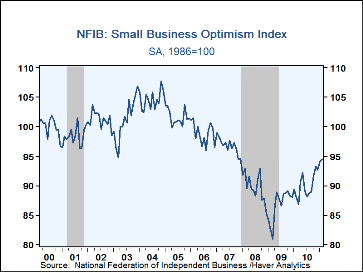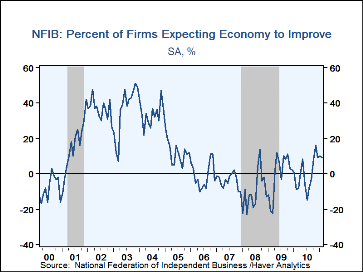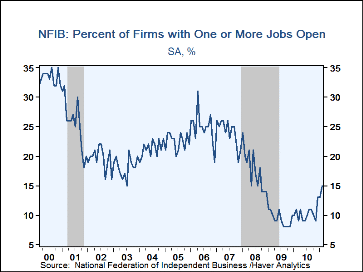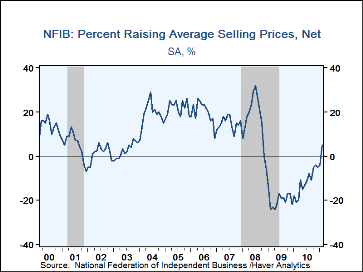 Global| Mar 08 2011
Global| Mar 08 2011U.S. Small Business Optimism Increases Further
by:Tom Moeller
|in:Economy in Brief
Summary
The National Federation of Independent Business indicated that its index of small business optimism rose to 94.5 in February from an unrevised 94.1 in January. The latest remained the highest level since December 2007. Improvement [...]
The National Federation of Independent Business indicated that its index of small business optimism rose to 94.5 in February from an unrevised 94.1 in January. The latest remained the highest level since December 2007. Improvement amongst the sub-series was mixed. The percentage of firms expecting higher real sales in six months rose to its highest since 2007. The percentage reporting higher earnings this quarter and those reporting that inventories were too low also increased. Working the other were declines in the percentage expecting the economy to improve and the percentage saying now was a good time to expand the business.
The number of firms with job openings now rose to its highest since September 2008 but the percentage of firms planning to add jobs also improved. The percentage expecting to make a capital expenditure in the next six months held constant at an improved level. Finally, the percentage of firms planning to raise prices increased further to its highest since late-2008, while the percentage of firms currently raising prices turned positive for the first time since October 2008.
Businesses making a capital expenditure during the next six months slipped to 49% and the percentage with few or no qualified job applicants for job openings rose to 30%.
The most important problems faced by small business were poor sales (28%), government requirements (19%), taxes (17%), insurance cost and availability (8%), quality of labor (7%), competition from large businesses (5%), inflation (5%) and financial & interest rates (4%).
Roughly 24 million small businesses exist in the U.S. and they create 80% of all new jobs. The NFIB figures can be found in Haver's SURVEYS database.
The Big Impact of Small Business from the Federal Reserve Bank of Atlanta is available here.
| Nat'l Federation of Independent Business | Feb | Jan | Dec | Feb'10 | 2010 | 2009 | 2008 |
|---|---|---|---|---|---|---|---|
| Small Business Optimism Index (SA,1986=100) | 94.5 | 94.1 | 92.6 | 88.0 | 89.9 | 86.7 | 89.8 |
| Firms Expecting Higher Real Sales In Six Months (Net %) | 14 | 13 | 8 | 0 | 1 | -11 | -7 |
| Firms Expecting Economy To Improve (Net %) | 9 | 10 | 9 | -9 | -1 | -0 | -10 |
| Firms With One or More Job Openings (Net %) | 15 | 13 | 13 | 11 | 10 | 9 | 18 |
| Firms Reporting That Credit Was Harder To Get (Net %) | 11 | 10 | 12 | 12 | 13 | 14 | 9 |
| Firms Raising Avg. Selling Prices (Net %) | 5 | -4 | -5 | -21 | -12 | -20 | 17 |
Tom Moeller
AuthorMore in Author Profile »Prior to joining Haver Analytics in 2000, Mr. Moeller worked as the Economist at Chancellor Capital Management from 1985 to 1999. There, he developed comprehensive economic forecasts and interpreted economic data for equity and fixed income portfolio managers. Also at Chancellor, Mr. Moeller worked as an equity analyst and was responsible for researching and rating companies in the economically sensitive automobile and housing industries for investment in Chancellor’s equity portfolio. Prior to joining Chancellor, Mr. Moeller was an Economist at Citibank from 1979 to 1984. He also analyzed pricing behavior in the metals industry for the Council on Wage and Price Stability in Washington, D.C. In 1999, Mr. Moeller received the award for most accurate forecast from the Forecasters' Club of New York. From 1990 to 1992 he was President of the New York Association for Business Economists. Mr. Moeller earned an M.B.A. in Finance from Fordham University, where he graduated in 1987. He holds a Bachelor of Arts in Economics from George Washington University.










